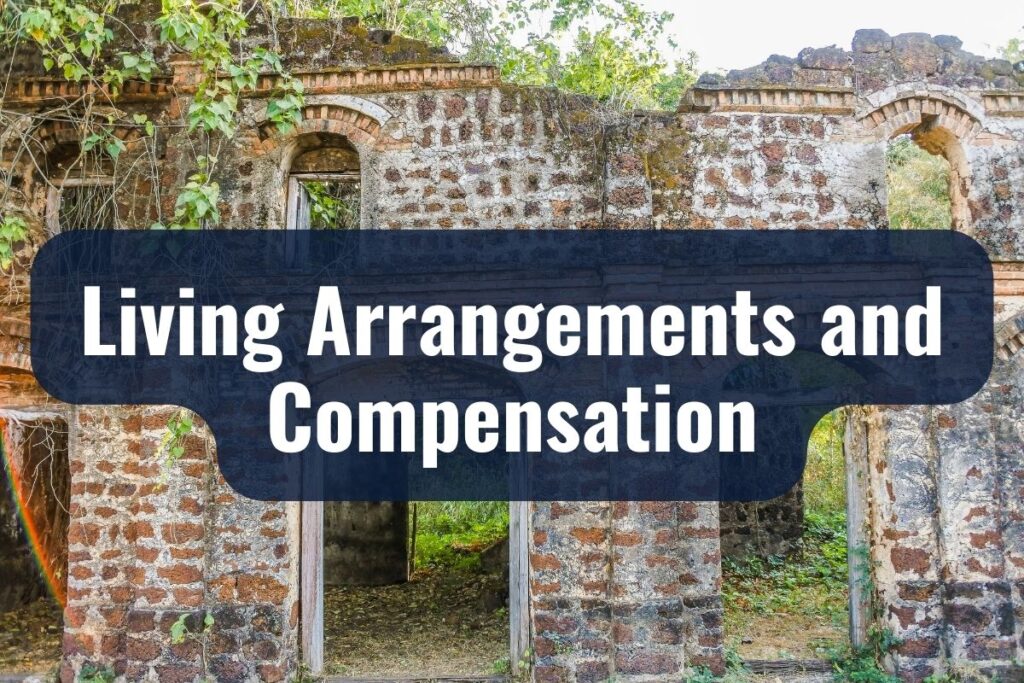Thailand is a top destination for tourists and has become a sought-after location for families seeking the enriching experience of hosting an Au Pair.
The lush landscapes, vibrant cities, and the nation’s renowned hospitality make it an attractive backdrop for this unique cultural exchange.
KEY TAKEAWAYS
- An Au Pair in Thailand offers a blend of childcare and rich cultural exchange.
- Distinct from nannies, Au Pairs immerse themselves in family life, fostering global connections.
- Legalities, like visas and work permits, require careful navigation for a smooth experience.
- Finding the right Au Pair match involves vetting, clear communication, and setting expectations.
- Living arrangements should balance comfort with genuine cultural immersion.
What is an Au Pair?
For those who might be new to the concept, an Au Pair is typically a young individual, often hailing from a foreign country, who assists a host family with childcare. In return, they receive room, board, and often a modest stipend. More than just a caregiver, an Au Pair is seen as a blend of a family member, teacher, and friend, bringing their own cultural nuances and traditions into the household.
The Growing Trend in Thailand
Over recent years, Thailand has witnessed a surge in the number of families opening their homes to Au Pairs. This isn’t just about seeking help with childcare.
It’s about embracing global connections, fostering international understanding, and providing children with a broader perspective of the world. For many Thai families and foreigners residing in Thailand, the Au Pair experience is a delightful journey of mutual learning and shared stories
Understanding the Role of an Au Pair

Distinction Between an Au Pair and a Nanny
While both Au Pairs and nannies play pivotal roles in supporting families with their childcare needs, it’s essential to understand their distinct differences. A nanny is primarily a professional childcare provider. They might have formal training in child development, and their main focus is on the well-being and care of the children. Their relationship with the family is typically that of an employer and employee.
On the other hand, an Au Pair is often a young individual looking for a cultural exchange experience. They come to live with a host family, not just to provide childcare but to immerse themselves in a new culture, learn a new language, and share their own traditions and backgrounds. The relationship is more familial, with the Au Pair becoming an extended member of the household.
Typical Responsibilities and Tasks
The role of an Au Pair in Thailand, much like elsewhere, encompasses a variety of tasks. These can include:
- Assisting with morning routines, such as helping children get ready for school
- Preparing light meals or snacks for the children
- Engaging in playtime, educational activities, and helping with homework
- Teaching the children about their own culture, perhaps introducing them to a new language or traditional games
- Assisting with light household chores related to the children, like tidying up play areas or doing the children’s laundry
It’s worth noting that, while Au Pairs do assist with childcare and some household tasks, they are not housekeepers or maids. The primary focus remains on the children and the cultural exchange.
Becoming Part of the Family’s Daily Life
One of the most enriching aspects of the Au Pair experience is the deep bond that often forms between the Au Pair and the host family. In Thailand, where family values are deeply rooted in the culture, an Au Pair is warmly welcomed and integrated into daily life.
They might join family outings, celebrate local festivals, and even participate in traditional ceremonies. This immersion offers a genuine taste of Thai life, making the experience rewarding for both the Au Pair and the host family.
Benefits of Hiring an Au Pair in Thailand
Cultural Exchange and Language Learning Opportunities
One of the most profound benefits of welcoming an Au Pair into your home in Thailand is the rich cultural exchange. With an Au Pair, families get a firsthand experience of different customs, traditions, and even cuisines.
Children, especially, benefit immensely from this exposure. They learn about global diversity, develop a more open-minded perspective, and often pick up a new language or at least a few phrases.
For the Au Pair, living in Thailand offers a deep dive into the country’s vibrant culture, from its festive celebrations to its culinary delights.
Flexibility in Childcare
Unlike more structured childcare services, an Au Pair offers flexibility that can be invaluable to families. Whether it’s adjusting to different schedules, assisting during unexpected situations, or simply being available for an impromptu family trip, the presence of an Au Pair ensures that childcare is both personalized and adaptable.
Building International Relationships
The bond formed between families and their Au Pairs often extends beyond the duration of the Au Pair’s stay. These relationships can blossom into lifelong friendships. Families might find themselves visiting their former Au Pair in their home country, or the Au Pair might return to Thailand for reunions. This global connection enriches the lives of both parties, creating a network of international friendships.
Cost-Effective Solution
While the primary motivation for hiring an Au Pair is rarely financial, it’s worth noting that having an Au Pair can be a cost-effective solution for many families. When considering the combined costs of childcare services, language tutors, and cultural enrichment activities, an Au Pair offers all these experiences, often at a fraction of the cumulative cost.
Personalized Care and Attention
With an Au Pair, children receive one-on-one attention, ensuring their individual needs are met. This personalized care can be especially beneficial for families with children who have specific needs or for those who thrive best with consistent and individualized attention.
Immersion in English or Other Languages
For families in Thailand looking to give their children a head start in English or another language, an Au Pair from an English-speaking country or any other nation can be an invaluable resource. Daily interactions, storytelling sessions, and playful activities in the target language can significantly boost a child’s linguistic abilities.
Hiring an Au Pair in Thailand is not just about childcare. It’s about opening doors to global understanding, fostering personal growth, and creating memories that last a lifetime.
Legalities and Requirements

| Aspect | Details |
| Visa Types | – Education Visa (ED Visa) |
| – Volunteer Visa | |
| Work Permit | Required for working in Thailand; responsibility often lies with the host family. |
| Contractual Rights | Personalized agreement covering duties, compensation, duration, and other terms. |
| Health Insurance | Advisable for Au Pairs; can be covered by the host family or the Au Pair’s personal insurance. |
Visa Requirements for Au Pairs in Thailand
Thailand doesn’t have a specific visa category for Au Pairs, which can sometimes make the process a bit intricate. However, many Au Pairs and host families navigate this by opting for alternative visa types:
- Education Visa (ED Visa): This visa is for foreigners who wish to study in Thailand. If the Au Pair plans to take language courses or any other form of education during their stay, this visa might be suitable. It’s essential to ensure that the chosen educational institution is recognized by the Thai government to qualify for this visa.
- Volunteer Visa: Some organizations offer programs where Au Pairs can come to Thailand as volunteers. While they work as Au Pairs for families, they are technically under a volunteer arrangement, which qualifies them for this visa type.
Work Permits and Documentation
Even with the right visa, working in Thailand typically requires a work permit. Given the somewhat gray area surrounding Au Pair work, it’s essential to clarify whether a work permit is needed. If required, the host family usually shoulders the responsibility and cost of obtaining the permit.
Documentation is vital. Both the Au Pair and the host family should have a clear, written agreement outlining duties, hours, compensation, and other essential terms. While this might not be a formal contract in the legal sense, it serves as a mutual understanding and can prevent potential misunderstandings.
Contractual Obligations and Rights
While Thailand doesn’t have standardized Au Pair contracts like some European countries, it’s beneficial to draft a personalized agreement. This contract should cover:
- Duration of the Au Pair’s stay
- Working hours and days off
- Specific duties and responsibilities
- Compensation details, including stipend, benefits, and any bonuses
- Termination conditions, if any
- Any other specific terms agreed upon by both parties
Health Insurance and Medical Care
It’s advisable for Au Pairs to have health insurance during their stay in Thailand. Some host families offer to cover the insurance costs as part of the benefits package, while others might expect the Au Pair to have their own insurance. Either way, ensuring that medical emergencies and routine care are covered is crucial for the well-being of the Au Pair.
Finding the Right Match
Trusted Platforms and Agencies in Thailand
The journey to finding the perfect Au Pair begins with choosing the right platform or agency. While there are numerous international Au Pair websites, it’s beneficial to consider those that have a strong presence or partnership in Thailand. These platforms often have a better understanding of the local nuances, legalities, and specific needs of families in the region.
Local Au Pair Agencies: These agencies, based in Thailand, can offer personalized services, from matching to post-placement support. They often conduct face-to-face interviews with Au Pairs and provide families with a curated list of candidates.
International Platforms: Websites like AuPairWorld, GreatAuPair, and others have extensive databases of Au Pairs from around the world. While they offer a broader selection, it’s essential to ensure they cater to placements in Thailand.
Interviewing and Vetting Potential Au Pairs
Once you’ve shortlisted potential candidates, the interview process begins. This step is crucial, as it’s the primary way to gauge compatibility, set expectations, and get a feel for the person who might become a part of your family.
Start with emails or messaging to discuss basic details, expectations, and any preliminary questions.
Platforms like Zoom or Skype are excellent for face-to-face interactions. Prepare a list of questions, discuss the Au Pair’s experience, and gauge their interest in Thai culture and lifestyle.
Always ask for and verify references. Past host families can provide invaluable insights into the Au Pair’s behavior, work ethic, and adaptability.
Setting Clear Expectations and Communication
Transparency is the foundation of a successful Au Pair placement. Both parties should be clear about their expectations to prevent misunderstandings later on.
Clearly outline what tasks the Au Pair is expected to handle. This can range from childcare duties to language lessons or light household chores.
Discuss the living conditions, privacy expectations, and any house rules that the Au Pair should be aware of.
Highlight the importance of cultural exchange. Discuss how the family plans to introduce the Au Pair to Thai culture and how the Au Pair can share their own traditions.
Trial Period
If possible, consider having a trial period before finalizing the long-term arrangement. This allows both the family and the Au Pair to assess the fit and make any necessary adjustments to ensure a harmonious relationship.
Living Arrangements and Compensation

Typical Housing Situations for Au Pairs
In the heart of Thailand, the living arrangements for Au Pairs can vary based on the family’s location, preferences, and the Au Pair’s comfort level. However, some standard practices ensure the Au Pair feels at home.
Most Au Pairs are provided with a private room in the family’s house or apartment. This space should be comfortable, adequately furnished, and offer a degree of privacy. It’s essential for the Au Pair to have a space where they can relax and unwind.
While the Au Pair will have private quarters, they’ll typically share common areas like the living room, kitchen, and possibly bathrooms with the family. It’s crucial to establish guidelines for shared spaces to ensure everyone’s comfort.
In some cases, families might offer separate accommodations, like a nearby apartment or a guesthouse, especially if they have the means and space. This setup can provide more privacy but might reduce the immersive family experience.
Average Compensation and Benefits
The compensation for Au Pairs in Thailand can vary based on the family’s financial situation, the Au Pair’s experience, and the scope of responsibilities. However, there are some general guidelines:
Au Pairs typically receive a weekly or monthly stipend. This is not a salary per se, as the arrangement is more of a cultural exchange, but it provides the Au Pair with pocket money for personal expenses.
In addition to the stipend, Au Pairs receive free room and board. This includes daily meals and any utilities associated with their stay.
families offer extra perks like a monthly transportation allowance, contributions to language classes, or even bonuses for special occasions or exceptional performance.
Cultural Norms and Etiquette to Be Aware of
Thailand is rich in traditions and customs, and it’s essential for Au Pairs to be aware of and respect these nuances.
Thai culture places significant emphasis on respecting elders. Simple gestures like the traditional Thai greeting, “wai,” can go a long way in showing respect.
It’s customary to remove shoes before entering a Thai home. This practice keeps the house clean and is a sign of respect.
When dining, it’s polite to wait for the eldest person to start eating first. Also, using a fork and spoon is more common than using knives and forks.
With Buddhism being the predominant religion, there are several customs, like not pointing feet towards religious artifacts or monks, that should be observed.
Open Dialogue on Expectations
It’s essential for families and Au Pairs to maintain an open dialogue about living arrangements and compensation. Regular check-ins can help address any concerns, adjust expectations, and ensure a harmonious living situation.
Challenges and Solutions
While the Au Pair experience in Thailand can be immensely rewarding, it’s not without its set of challenges. Recognizing these potential hurdles and being prepared with solutions can ensure a smoother journey for both the Au Pair and the host family.
Overcoming Language Barriers
Thailand’s official language is Thai, and while many in urban areas might speak English, it’s not universally spoken. This can pose communication challenges for Au Pairs, especially in daily interactions outside the home.
Encourage Au Pairs to take basic Thai language courses. Many local institutions offer short-term courses tailored for foreigners. Additionally, using translation apps or carrying a pocket phrasebook can be handy. Over time, immersion will naturally enhance the Au Pair’s language skills.
Cultural misunderstandings can arise from differences in customs, traditions, or even daily habits. These can lead to unintentional offenses or feelings of discomfort.
Host families can organize a cultural orientation session upon the Au Pair’s arrival. Discussing key Thai customs, festivals, and etiquette can be enlightening. Likewise, the Au Pair can share about their culture, creating a mutual learning experience.
Building Trust and Rapport
Trust is foundational in the Au Pair-host family relationship. However, building this trust can take time, especially when both parties come from different backgrounds.
Spend quality time together. Engage in activities like cooking a meal, visiting a local market, or exploring a nearby temple. Shared experiences can foster understanding and strengthen bonds. Regular, open conversations can also help address any concerns or misunderstandings.
Adjusting to a New Climate and Cuisine
Thailand’s tropical climate and distinct cuisine can be a significant shift for many Au Pairs, leading to potential health or dietary challenges.
Ensure the Au Pair is well-informed about the local weather and necessary precautions. Provide guidance on staying hydrated and protecting against mosquitoes. When it comes to food, introduce Thai dishes gradually, and always check for any dietary restrictions or allergies.
Homesickness and Adaptation
Being away from home, especially in a different country, can lead to feelings of homesickness or isolation for the Au Pair.
Create an inclusive environment. Introduce the Au Pair to other Au Pairs or expat communities in the area. Encourage them to maintain regular contact with their family back home. Organize occasional trips or outings to help them explore and appreciate Thailand’s beauty.
Tips for a Successful Au Pair Experience in Thailand

Embarking on an Au Pair journey in Thailand is an adventure filled with opportunities for growth, learning, and cultural exchange. To ensure that both the Au Pair and the host family make the most of this experience, here are some tried-and-tested tips to keep in mind.
Open Communication and Regular Check-ins
Clear communication is the cornerstone of any successful relationship. Misunderstandings can arise, especially when merging different cultures and backgrounds.
Schedule regular check-ins, perhaps once a week, to discuss any concerns, share feedback, and plan for the week ahead. This dedicated time ensures that small issues don’t escalate and that both parties feel heard and valued.
Respecting Cultural and Personal Boundaries
Every individual has personal boundaries, and when combined with cultural nuances, it’s crucial to navigate these with sensitivity.
Take the time to discuss and understand each other’s comfort zones. Whether it’s related to personal space, dietary preferences, or cultural practices, mutual respect goes a long way.
Engaging in Local Activities and Experiences Together
Shared experiences can foster deeper connections and help the Au Pair integrate better into Thai culture.
Plan outings to local attractions, participate in Thai festivals, or even enroll in a Thai cooking class together. These activities not only create lasting memories but also enrich the cultural exchange.
Providing Support and Resources
Moving to a new country can be overwhelming. Providing the Au Pair with resources and support can ease their transition.
Equip the Au Pair with essential contacts, like a local doctor or a nearby language school. Introduce them to other Au Pairs or expats in the area, and perhaps even provide a small guidebook on the local area.
Encouraging Personal Growth and Independence
The Au Pair experience is not just about childcare; it’s also a personal growth journey for the Au Pair.
Encourage the Au Pair to pursue hobbies, take local courses, or explore Thailand during their time off. This independence can lead to a more fulfilling and balanced experience.
Flexibility and Understanding
Unexpected situations can arise, and plans might change. Being flexible and understanding can help navigate these moments smoothly.
If the Au Pair is feeling homesick or the family has an unexpected commitment, being adaptable and supportive can make all the difference. Remember, it’s a partnership, and mutual support is key.
In conclusion, the Au Pair experience in Thailand is a dance of mutual respect, understanding, and collaboration. By embracing these tips and approaching the journey with an open heart, both families and Au Pairs can create a harmonious and enriching chapter in their lives.


